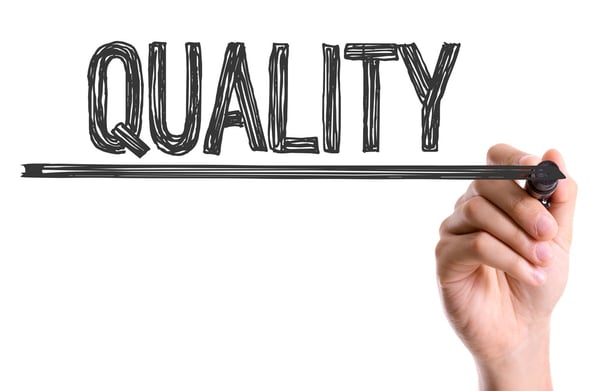Providing quality products or services is crucial for all businesses. Whether you are a small, medium or large enterprise, consistent quality products are a great way of maintaining customer satisfaction as well as loyalty. This also means that there are fewer risks to the customers and reduced costs of replacing or repairing failed products.

A business that provides quality builds trust, good reputation, and recognition by customers as well as regulatory bodies. Other than loyal repeat customers, the good products enable the organization to gain more clients through referrals, meaning that they spend less on advertising their services.
Quality control goes beyond actual products and services. Because for a business to offer these, its work processes must be well organized, coordinated and executed efficiently. By integrating quality control in the management and work processes, the organization is able to get the maximum productivity at reasonable cost and time.
Quality control in oil and gas industry
In a competitive and capital-intensive industry like the oil and gas, quality control is critical. Besides providing reliable products, it also improves efficiency, safety, and the company’s social responsibility. Without controls, the collapsing infrastructure or failure to observe strict safety practices can cause fires, leakages and other oil-related problems that lead to loss of money for the company, as well as damage to the environment. Further, failures due to lack of maintenance or negligence can lead to loss of life, serious injuries or health implications.
The oil industry operates under complex operational and market conditions. As such, the companies must offer their customers value for money while still making profits. Without good management and controls, it is very hard for any company to stay afloat. They will provide poor services, hence loose customers, or sell their products at higher prices than their production costs, thus make losses. But employing some proven methods can save them operational costs, reduce downtimes, increase efficiency and revenue. Because the company relies on a wide variety of equipment and infrastructure, maintaining them is a major requirement for their success.
A failure in any oil and gas equipment can lead to length downtimes and losses. For this reason, the best approach is to avoid unplanned downtimes by monitoring and inspecting the infrastructure as well as performing regular maintenance. Using modern technologies such as drones inspections, AI, robots and analytics, the oil and gas company can reduce the inspection and maintenance times and costs significantly.
What constitutes quality?
No business, regardless of size, should neglect quality control. However, this should not just focus on the end product; it must address the management, processes, and interaction with customers or suppliers. When well done, it ensures better operations, maintenance of equipment and facilities hence reduced downtimes and losses. This eliminates distrust and fears about safety risks within and outside the company.
For a business to provide quality products, it must embrace have good practices in its management, internal processes, and production areas. This should encourage teamwork, professional development, and integrity.
To produce high-quality products, organizations must pay attention to the all materials, components, structures, and systems that it is using in the manufacturing process. This should also involve the people so that they work as a team towards achieving the best. In particular, all departments must coordinate with each other to ensure smooth flow of operations, fewer downtimes and time to produce a product or deliver service without compromising quality.
The main components of a quality control are:
· Continuous improvement, hence the organization must budget for this and avail resources and time as well as have the drive and determination to achieve the best
· Improving business critical areas all the times, but also not forget the other supporting areas.
· Cooperation and teamwork by managers, supervisors and other staff at all levels
· Ability to listen and respond to customer needs
· Good planning and actions based on findings and feedback from regulatory bodies, customers, and within the organization
· Goal to provide the best quality product or service
· Verify that products comply with operational, safety and other regulatory standards. This helps organizations to rectify any issues such as changing the design before releasing them to the market.
A good quality control approach is to test products as a user and see if there are any flaws or areas that require improvements. Failure to do this, the customers will tell you in a not so polite way. For example, instead of complaining, they will simply walk away and look for alternative products from competitors.
Benefits of quality control
Each organization should, therefore, have a strategy to improve the quality of work processes, performance, and products.
This has a positive effect on employees’ morale and productivity and several benefits and highlighted below.
Meeting the customer need and expectations
A business that implements good quality controls in its processes is in a better position to provide products that fully meet their client’s requirements. This improves customer satisfaction and the potential for the business to retain and have repeat customers over long periods. It also guarantees better and long-term revenues and profits. Failure to address customer expectations will most likely see your present and potential customer looking for alternative products. With a quality product, a business can charge a premium without losing customers, since most of them will not mind the cost as long as you address their needs.
Ensuring compliance with Industry Standards
Quality control is important in ensuring products comply with the standards, especially in the more regulated industries. If making components or subsystems of a certain product, you must meet the quality standards that a lead manufacturer imposes. In such a case, the manufacturers don’t have to inspect or test the components from third part sub-contractors or suppliers as long as they meet an established or recognized standard.
Compliance is also important for the company since it can market its products anywhere in the market as long as they recognize that standard. In addition, it ensures safety and reliability. When your product meets certain standards, they can earn accreditations from various regulatory bodies. This recognition of quality can help an organization to acquire new customers since they will have faith and trust in the products.
Maintain a good reputation
Quality is one of the reasons that companies earn a good reputation. Satisfied customers are likely to talk positive things about a company as well as recommend its quality products to others. In addition, the internet now allows people to share their experiences in social media or review sites. When customers see value in the products and services, their positive reviews can go a long way in enhancing the company’s marketing efforts.
This cannot be said for poor quality products which will definitely attract negative reviews and feedbacks hence damaging the company’s reputation. This can even lead to losses, bad media attention, and possible product recall or even lawsuits.
Good quality is a result of efficient and proper processes. Once the business establishes efficient control systems, it ensures better products and reduced costs. Verifying product quality is one of the main components of quality control which organizations can do in-house and eliminate incidences of product recalls since they can rectify issues before going to the market.
Better cost control
Lack of quality control within the organization as well as coordination across various departments is a recipe for inefficiencies, downtimes and low revenues. Inefficiency increases production costs and could potentially result in poor services and products. A company ends up spending more money to analyze and rectify non-compliant products and may also suffer from recalls since they have to incur additional costs compensating the customers. Finally, producing non-compliant goods exposes the company to possible legal costs.
With quality control, a company is able to plan and budget well hence control the operational and production costs.
Gaining confidence as a company
A company with good quality control practices is usually proud to talk about its products. They have the confidence that all is well and do not fear customers coming up with lawsuits due to malfunctions or accidents arising from defective products.
It also makes employees and investors proud of being associated with the success of the company. In addition, it motivates everyone such that they are able to provide their best and ensure that the company keeps on improving and succeeding.




